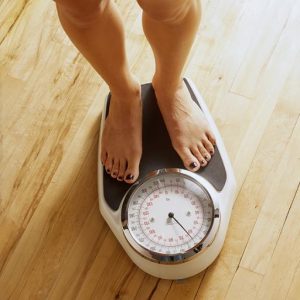One of the big findings from AICR’s new report is that excess body fat increases a woman’s risk of endometrial cancer. Research already shows that being overweight increases risk of other cancers, such as post-menopausal breast and colorectal.
Maintaining a healthy body weight plays a key role in good health for both men and women – but as women, there are unique obstacles we face that can make weight loss a bit harder. Here are a few weight challenges I’ve seen women face and ways to overcome them.
- Calorie needs. Women generally have a slower metabolism (due to differences in body build) compared to men. For example, the calorie needs for a sedentary, 35 year-old women who is 150 pounds and 5’5” inches tall are about 1,800 per day, while those for a man of the same age, height and weight are about 2,000 calories per day.
Overcome it by making healthier choices at restaurants (swap the fries or mashed potatoes for steamed vegetables) and keep portions in check. Recognize everyone has different calorie needs – eat based on your own hunger and fullness, not based on what others are eating.
- Pleasing the whole family. If you’re like many women, you do most of the cooking for your family so you might know how difficult it can be to please everyone (especially if you live with picky eaters!).
Overcome it by always including a couple vegetables with the meal (use fresh, frozen or canned). That way you can fill up on a low-calorie nutritious options and it will give your family members a choice.
Don’t cook with added fats and salt; instead, let other household members add these things to their own meals if they want. This will help you ensure your dish is healthier, despite how others want to eat their food.
- Menopause-induced weight gain. Women often gain weight during menopause due to decreased energy needs that come with aging, hormonal changes that can lead to increased weight gain around the abdomen, genetic factors, or other life stressors that may occur around this time (such as children leaving the house).
Overcome it by moving more and eating less. Plan to increase your activity levels by adding in an extra walk, signing up for a gym class with a friend or taking the stairs more often. Combine that with lowering the total amount of calories you eat in a day – one way to do this is to increase your vegetables at meals while decreasing the amount of meats along with noodles, rice or other starchy foods.
- Post-partum weight retention. Many women have trouble losing all the extra weight gained during pregnancy.
Overcome it by striving to achieve a healthy body weight before pregnancy, aiming to gain only the amount of weight recommended by your doctor during pregnancy, and breastfeeding your baby. Breastfeeding is associated with a number of health benefits, including a reduction in breast cancer risk and helping with weight loss (along with benefits to your baby too!).
What factors make it most difficult for you to lose weight?
Sonja Goedkoop, MSPH, RD, is a clinical dietitian at the Massachusetts General Hospital Weight Center. She has a passion for promoting a healthy lifestyle and reducing obesity through improved nutrition and physical activity. You can follow her on twitter @SonjaGoedkoopRD.





